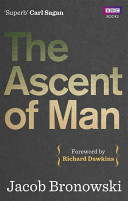Man is Distinguished from Other Animals by his Imagination
Among the multitude of animals which scamper, fly, burrow and swim around us, man is the only one who is not locked into his environment. His imagination, his reason, his emotional subtlety and toughness, make it possible for him not to accept the environment, but to change it. And that series of inventions, by which man from age to age has remade his environment, is a different kind of evolution—not biological, but cultural evolution. I call that brilliant sequence of cultural peaks The Ascent of Man. I use the word ascent with a precise meaning. Man is distinguished from other animals by his imaginative gifts. He makes plans, inventions, new discoveries, by putting different talents together; and his discoveries become more subtle and penetrating, as he learns to combine his talents in more complex and intimate ways. So the great discoveries of different ages and different cultures, in technique, in science, in the arts, express in their progression a richer and more intricate conjunction of human faculties, an ascending trellis of his gifts.
Notes:
Man evolves culturally.
Folksonomies: evolution memetics culture
Taxonomies:
/science/mathematics/arithmetic (0.459722)
/shopping/gifts (0.404724)
/science/social science/history (0.360956)
Keywords:
man (0.968885 (positive:0.179536)), emotional subtlety (0.945645 (neutral:0.000000)), Imagination Man (0.928823 (positive:0.221967)), great discoveries (0.909954 (positive:0.643846)), word ascent (0.909684 (positive:0.674362)), new discoveries (0.899805 (positive:0.309431)), brilliant sequence (0.888088 (positive:0.570704)), intricate conjunction (0.873625 (positive:0.569680)), precise meaning (0.872927 (positive:0.674362)), human faculties (0.861873 (positive:0.569680)), cultural peaks (0.852118 (positive:0.570704)), imaginative gifts (0.844692 (positive:0.529132)), cultural evolution (0.838104 (positive:0.305000)), intimate ways (0.837920 (positive:0.713584)), different talents (0.837414 (positive:0.357912)), different kind (0.834887 (positive:0.211465)), different cultures (0.808676 (positive:0.643846)), different ages (0.804707 (positive:0.643846)), animals (0.692560 (negative:-0.040172)), environment (0.685245 (negative:-0.300969)), inventions (0.640539 (positive:0.213476)), toughness (0.540514 (neutral:0.000000)), multitude (0.524756 (negative:-0.415722)), trellis (0.519240 (positive:0.491266)), reason (0.503479 (neutral:0.000000)), progression (0.502531 (positive:0.569680)), series (0.487548 (neutral:0.000000)), technique (0.481651 (neutral:0.000000))
Concepts:
Culture (0.961863): dbpedia | freebase | opencyc
Ecology (0.681288): dbpedia | freebase | opencyc
Anthropology (0.673588): dbpedia | freebase | opencyc
Natural environment (0.649151): dbpedia | freebase
Life (0.617658): dbpedia | freebase
Species (0.616419): dbpedia | freebase | opencyc
Human (0.603138): dbpedia | freebase | opencyc
Psychology (0.590484): dbpedia | freebase | opencyc






